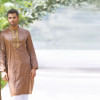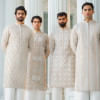Ahmed Tuhin Reza: The ultimate panjabiwala

In the world of Bangladeshi fashion, Ahmed Tuhin Reza stands out as a visionary designer in men's traditional attire, particularly in the realm of panjabis. With an eye for both heritage and innovation, he has reshaped how men approach festive and everyday traditional wear.
"First thing for men is panjabi; there is no celebration of a traditional occasion in Bangladesh without the quintessential attire," Ahmed asserts.
Interestingly, Ahmed Tuhin Reza, the Managing Director and Creative Director of House of Ahmed, notes that the panjabi has undergone substantial transformation over the years.
"Even 20 years back, fashion had not been incorporated into panjabis as it is now," he says.
The designer observes that today's generation is increasingly fashion-conscious and adventurous, exploring diverse designs to enhance their style.

Ahmed's take on panjabis in a local context
Ahmed sees no harm in being influenced by foreign fashion. Rather, he believes that instead of altering the tastes of the Bangladeshi market, designers should adapt and incorporate global influences into their creations.
"If Bangladeshi people are inclined towards Bollywood or other influences, we should work on adopting fashion and making it our own!" he says.
As cultural perspectives shift around festivals, Ahmed observes an increasing demand for unique designs.
"Previously, festivals were not so creatively celebrated in the fashion space," he recalls. "However, occasions like Pahela Baishakh have now redefined cultural expression, 'demanding rickshaw art and fun factors,' as well as more sophisticated designs for Eid and other celebrations."
On the topic of design influences, Ahmed expresses a fondness for the timeless appeal of white.
"White inspires me. It's a timeless colour; whether in normal cotton or full zardozi, white never goes wrong," he says.
Taking Bangladeshi panjabis global
"It completely depends on us," he asserts.
By focusing on traditional fabrics like Jamdani, Muslin, and silk, Reza aims to create a luxury brand that showcases the richness of Bangladeshi craftsmanship.
"We have to give artisans good pay and quality of life to create a second line of craftsmen," he continues. He believes that elevating the artisans' quality of life will lead to a sustainable model, ultimately allowing Bangladeshi fashion to compete on a global scale.
"We work with foreign models as well, so we are trying to expand our reach," Ahmed Tuhin Reza adds, reflecting his commitment to not only improving local production but also showcasing Bangladeshi talent internationally.
Ahmed's ambition extends beyond mere aesthetics; he envisions a future where Bangladeshi sensibilities in fashion can command a place on international runways.
"We promise the Bangladeshi people that we will make a Bangladeshi brand global," he states with palpable conviction. This goal is not solely about marketing but also about cultural representation, ensuring that the rich heritage of the Bangladesh textile industry is celebrated worldwide.
Ahmed's journey with House of Ahmed, along with his wife Tanzila Elma, co-founder of HOA, illustrates the delicate balance between honouring tradition and pushing boundaries within the fashion industry.
From the meticulous craftsmanship of muslin panjabis to the incorporation of modern aesthetics, Ahmed Tuhin Reza is tirelessly working to redefine what menswear can embody in Bangladesh. As he reflects on the current and future trends, it is clear to him that the world is ready for Bangladeshi fashion.
Photo: Courtesy

 For all latest news, follow The Daily Star's Google News channel.
For all latest news, follow The Daily Star's Google News channel. 








Comments